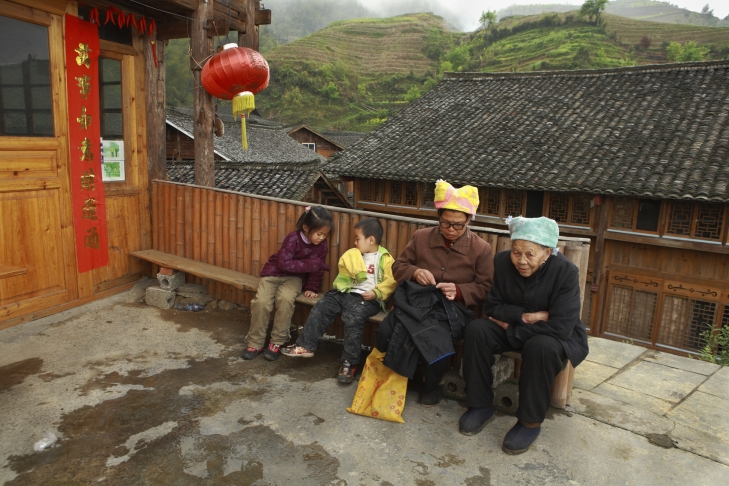
Migrant workers leave behind children to be taken care of by the elderly in villages – it is a win-win arrangement for all involved
According to a January 2016 report by China’s National Bureau of Statistics, there were 277 million rural migrant workers in the country working in cities away from their place of national registration, or hukou (户口). Their children are usually left behind in their hometowns and taken care of by the elderly in skipped-generation households consisting of only grandparents and grandchildren.
Family finances are generally improved via remittances from urban-dwelling parents of the grandchildren. In a study by Merrill Silverstein of Syracuse University, grandparents gained 723 renminbi (approximately US$110) monthly compared to before the adults left for the cities. On the other hand, that figure fell to 247 renminbi when their adult children returned from the cities.
The study also showed lower incidences of depressive symptoms by grandparents in skipped-generation households. These elderly are also less likely to suffer from physical ailments.
“They’re better off physically and emotionally, they’re getting more money from their kids. What could be wrong?” asks Silverstein at a recent SMU-SOSS Seminar, Left-Behind Elders in Rural China: Benefactors and Beneficiaries in China's Recent ‘Leap Forward’. “There are selective pressures in how grandparents become caregiving grandparents. Those who are asked to do it are usually in better health because they are able to take care of kids.
“They’re less depressed because they are more energetic and have more zest for life and care for their grandchildren. It’s a selective issue, it’s not that caregiving has made them more healthy.”
Those findings are borne out by another factoid in the study: more grandparents are providing full-time care for their grandchildren compared to before. From 2001 to 2009, the proportion of grandparents providing full-time care to their grandchildren jumped from 22.4 percent to 37.5 percent. Grandparents who provided part-time care dropped from 48.5 percent to 34.5 percent. One might conclude that the health of Chinese villagers have improved dramatically in tandem with the country’s breakneck economic development.
Hukou reform, pensions and filial piety
The situation sounds like a win-win solution: healthy grandparents bonding with grandchildren while their grownup children send home money to pay for the elderly’s medical care or the grandkids’ education. This arrangement, however, is predicated on the separation of parent and young children.
“It is a fact that many of them chose not to bring their children to the city, but it wasn’t because the hukou system prevented them from doing so,” explains Forrest Zhang, Associate Professor of Sociology at Singapore Management University. Zhang points out rural migrants can pay school fees – elementary education is tuition-free for children attending school in their hukou hometown – to send their kids to urban schools. “Not every migrant is going to Beijing or Shanghai. A lot of migrants are going to second- or third-tier or county level cities, and they can easily enroll their children in those schools.”
He adds: “It’s the economic considerations, plus both parents are putting in long working hours and could not take care of the kids [that stops them from taking the kids to the city]. It’s much better leaving the children with rural parents.”
Additionally, the new rural social pension scheme, which started in 2009, hardly pays out enough to make ends meet without remittances from those with an urban income. Some of the poorer provinces pay out as little as 55 renminbi per month. Ongoing hukou reforms could make children of migrant workers eligible for free education – assuming there are enough spots in schools in competitive megacities cities – thus making it possible to reunite young children with their migrant worker parents in cities without the burden of tuition fees. In theory, migrant workers can have the best of both worlds: Fulfill societal expectations of fillial piety by sending money back home while having their kids with them in the city. But will that be case?
“We speculate that perhaps the pensions are crowding out intergenerational transfers,” Silverstein says. “If you’re getting money from the state then the children will provide that much less because they won’t have to [do so] anymore. These are meagre pensions but once they get through the door, those pensions are going to grow; they’ve already doubled in the last five years.
“The Chinese government is concerened that if it grows too fast and too much, it will dissuade families from contributing, leading to an erosion to filial-piety.”
He concludes: “Grandparents are the unacknowledged foundation on which China’s economic success rests. You wouldn’t have those migrant workers building these big cities and making iPhones in factories without the help of these grandparents.”
Follow us on Twitter (@sgsmuperspectiv) or like us on Facebook (https://www.facebook.com/PerspectivesAtSMU)
Last updated on 27 Oct 2017 .